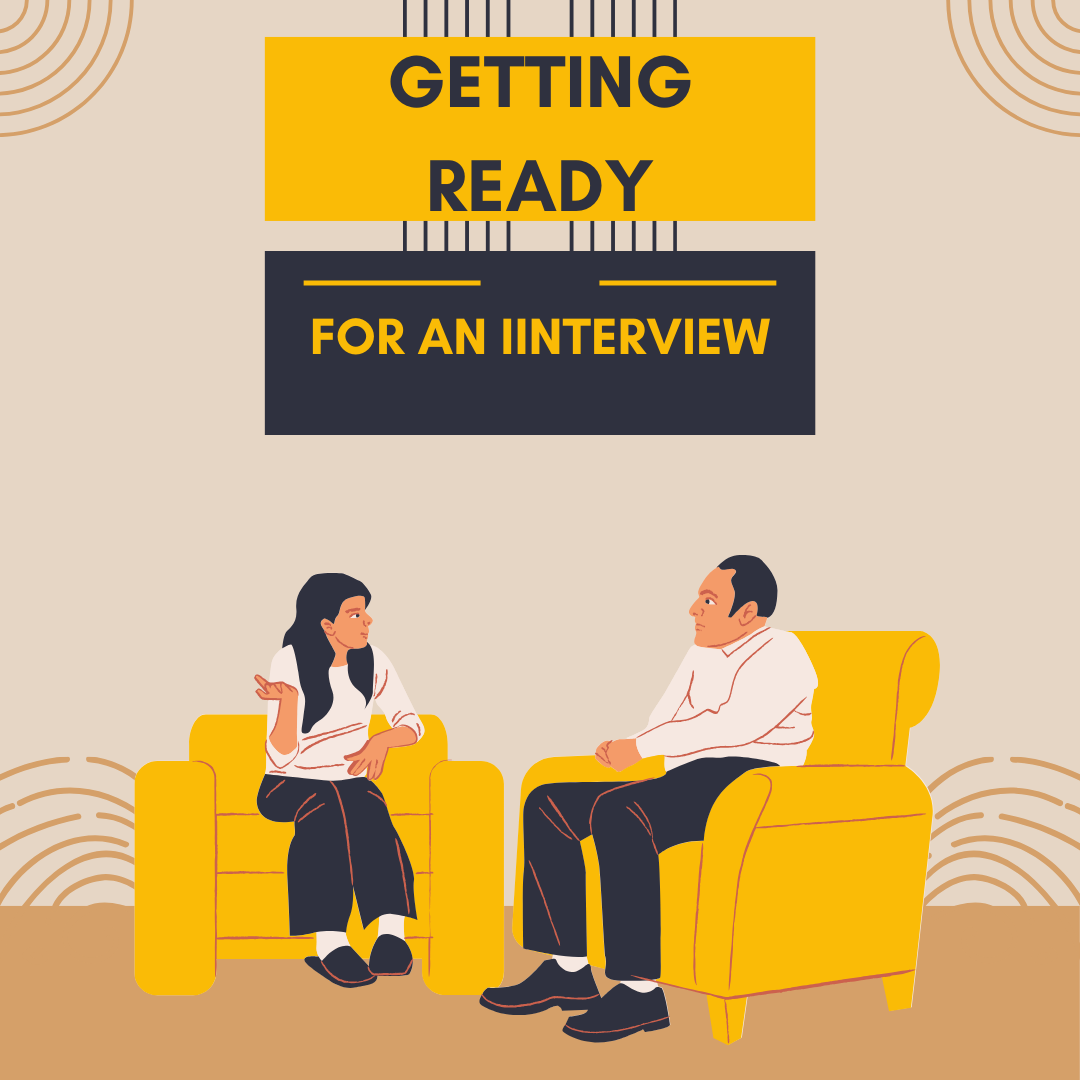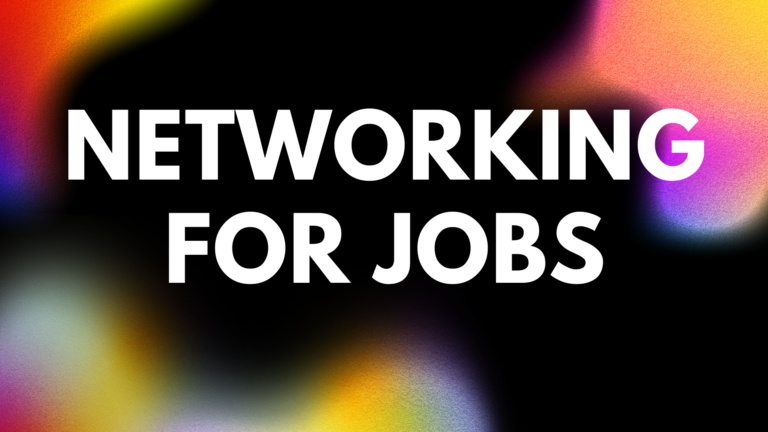Getting ready for an interview
Getting ready for an interview can be stressful. You’re improving important skills that will help you do well in the interview by practicing for it. You’re also ensuring that you have learnt important knowledge that will help you stand out and that your interview technique is on target.
Here are some tips for interview preparation if you want to be sure you’re headed in the right direction.
What Does It Actually Mean to “Be Prepared for an Interview”?
The concept of being ready for anything is somewhat vague for many people.
What distinguishes the well-prepared from the poorly-prepared? Does the process of getting ready require a specific amount of time? Do you need to do any crucial actions in order to pass the threshold?
“No” is the technical response to those queries. Being ready usually indicates that you have done your research. You are skilled at presenting your accomplishments in a way that appeals to the hiring manager. You can include pertinent, research-based tidbits of information.
In essence, being prepared means that you have taken all the required actions to position yourself for success, which will enable you to show up to the interview full of confidence. You’ve given the process your whole attention and time.
Being prepared isn’t a very clear concept, but it doesn’t mean you can’t take the necessary steps to make it happen. By taking the appropriate actions, which we’ll discuss shortly, you may conduct appropriate, laser-focused research, be ready, and practice pertinent
Common Errors to Avoid When Preparing for Interviews
The biggest error you can make when it comes to interview preparation is to not prepare at all. Even if you’re a highly-skilled professional overflowing with potential and natural poise, you can’t assume that is enough.
A typical interaction with a coworker is not the same as an interview. Rather, you’re being put to the test, asked to defend your resume, and placed on the spot. Some questions are meant to make you backtrack. Others are so vague that it’s simple to get off subject.
Preparation allows you to be at your best when that fateful interview day arrives. You’ll have great answers just waiting to be deployed, and a strategy that can help you navigate the unexpected. In turn, you’ll be more likely to succeed, making all of the effort worthwhile.
An interview is not the same as a normal conversation with a coworker. Instead, you’re being tested, asked to defend your resume, and put in a difficult situation. Some questions are designed to force you to take a step back. Others are so ambiguous that it’s easy to veer off topic.
You can perform at your best on that fatal interview day if you prepare. You’ll have excellent responses ready to go and a plan to deal with unforeseen circumstances. As a result, your chances of success will increase, making the work worthwhile.
In a similar vein, omitting important characteristics from your responses may backfire. For instance, you can’t just say you’re detail-oriented during an interview. Rather, you must demonstrate your attention to detail by describing a success to demonstrate your abilities.
Last but not least, failing to obtain the assistance of a reliable friend, relative, or coworker is one of the most unexpected errors a candidate can make. It is incredibly beneficial to have someone else ask you the practice interview questions and to receive feedback on your responses, body language, and other aspects of your performance. It enables you to truly refine your strategy, guaranteeing that you can leave the greatest impression.
Additionally, we wanted to inform you that we have developed a fantastic free cheat sheet that will provide you with exact answers to some of the most difficult interview questions you will encounter in the future.
To properly prepare for your interview, follow these steps.
Now that you have a basic understanding of the importance of interview preparation and some common pitfalls to avoid, let’s get right to the point: how to prepare for an interview. After all, simply understanding that you must do something is only half the fight; you also need to follow through with the appropriate strategy.
- Examine the job description
Examining the job description is the first thing you should do in order to prepare for an interview. The essential abilities and qualities the hiring manager is looking for are among the many important details that are packed into the job description.
Go over the original vacancy announcement word for word after you’ve brought it up. Think about underlining or making a list of the abilities and traits you see. Your interview will probably cover everything the hiring manager thought should be included.
The job description is essentially a cheat sheet. You should be ready to demonstrate your possession of any skills or qualities that the hiring manager may have specified in the job description!
- Go over your application or resume again.
Have you looked over your résumé again? Why would you have to take that action? You are aware of your own history, after all. Sort of.
You might forget what you put on your CV if you customize it for each job, which is something you should do, and you’ve applied to multiple jobs recently. That might be problematic.
It is nearly a given that the recruiting manager will review your CV. If you forgot which accomplishments you mentioned, you might not prepare to discuss them. Then, if the hiring manager asks – which they almost certainly will – you might give a stumbly answer.
- Examine the business
We are aware that research isn’t always enjoyable. Nevertheless, it is essential.
A lot of hiring managers want applicants to share their knowledge about the business. You can effectively bid the job farewell if you respond to that inquiry in silence.
Spend some time examining the goods and services offered by the business. It is imperative that you have a basic understanding of how the business generates revenue.
Examine the company’s mission and values statements on its website as well. This provides you with important hints regarding the culture and priorities of the company. For additional information and specifics regarding the company’s most recent accomplishments or noteworthy events, visit its social media pages.
The more information you can incorporate about the organization into your interview responses, the better. It can help you stand out from the crowd because it demonstrates that you took the time to learn about them.
- Get to Know the Employer
Learn a little bit about the person who will be interviewing you if you know who they are. You can adapt your strategy to the hiring manager’s preferences if you can learn about their priorities, viewpoint, and professional background. This facilitates rapport-building and the discovery of common ground.
5.Examine Your Achievements
Take some time to consider your accomplishments now that you have a better sense of what you’ll need to address. You want to demonstrate to the hiring manager that you have what it takes to succeed during the interview. That usually entails talking about a noteworthy achievement.
Finding pivotal points in your career that demonstrate your excellent match is ideal. Write down the ones that most clearly demonstrate your possession of the abilities and attributes listed in the job description as you think about it. You want to include those achievements into your responses.
- Calculate the Specifics
Now that a few accomplishments have been selected, it’s time to compile some more information. Quantify those successes since in an interview, numbers can speak louder than words.
This sometimes calls for some investigation. You may not recall how many people used something you designed or how large a budget you oversaw. Check it out! In this manner, the data you offer is accurate and appealing.
- Recognize the Different Kinds of Interview Questions
Now is the time to begin working out how to incorporate pertinent information into your interview responses. Studying the many types of interview questions is one of the greatest places to start.
- Practice Common Interview Questions
Certain job interview questions are almost universal, so it is smart to practice them. Grab a list of common ones and get cracking, using the techniques you’ve developed so far to create compelling answers.
- Practice Questions for Job-Specific Interviews
You want to get job-specific, but you should also spend time on general interview questions. Hiring managers will ask questions that assist them determine whether you have the abilities and qualities necessary for each type of work.
For instance, look out interview questions for data analysts if you’re hoping to get a job as one. Examine the questions that hiring managers at Google, Facebook, and Microsoft ask if you are interviewing for those positions. In this manner, you will be as prepared as possible for your interview.
10.Select Your Interview attire
Make sure that your attire presents you as the best candidate for the position. Decide on your outfit a few days in advance. Check for wear and tear and make sure it fits by trying it on. That way, if there’s an issue, you can choose something else without having to rush.
Bringing Everything Together
That’s it! When it comes to how to prepare for an interview, that’s what you need to know. Take those tips and use them to your advantage. By doing so, you’ll increase your odds of job interview success, making all of the effort worthwhile.








